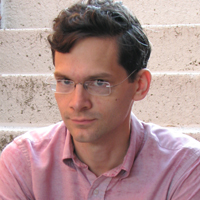In a recent review, Joyce Carol Oates classified Rebecca Mead’s new My Life in Middlemarch as “bibliomemoir”: that is, as criticism done with the intimate flair of confessional. It’s a big confession, after all, to name your favorite book. Even that term, “favorite,” can be embarrassing. Mead prefers to say that, “Most serious readers can point to one book that has a place in their life like the one that Middlemarch has in mine.” Mead cites her husband’s devotion to Proust, one friend’s relationship with David Copperfield, another’s with The Portrait of a Lady.
People do talk like this. It’s partly a matter of sociability: hence the preference for well-known classics that friends and acquaintances will have read. Picking favorites is in anticipation of being asked; and many of us even select what to read with potential conversations in mind. It takes luck, too. Our reading lives have been hauled together out of scraps of time and lucky enthusiasms: if it happens you haven’t read Middlemarch (880 pages), it can’t be your favorite. At the end of her review, Joyce Carol Oates turns on Mead, and asks if there isn’t something “self-limiting” about giving one single book such a place in your life. "Are not the radically experimental novels of Virginia Woolf more exciting, simply as aesthetic experiences?” Oates has put her finger on the key exaggeration that makes Mead’s book a good sell: the fantasy it offers, like true love, of a one-to-one relationship with a book. And yet Oates should give Mead more credit. Every bibliomemoir is a confession of limitations. It’s a kind of book I’m always hungry to read.
Because the pressure to read everything in the canon—and to like everything—never really goes away. A recent n+1 book, No Regrets, devotes itself to frank roundtable discussion of all the messed-up and serendipitous ways we reconcile ourselves to this situation, growing up. The editor, Dayna Tortorici, remembers a moment in college when she realized, “I had already wasted two years reading the wrong things!” Reading lists, sometimes a collection of wary hunches, sometimes avidly collected recommendations, are refracted through different literary worlds. The phrase “I wish” gets used repeatedly: had I been able to read Didion or Hemingway at an earlier stage, I would have been smarter, wiser, further along in life.
By limiting the participants in her discussions to women, Tortorici ensures that we don’t forget the social construction of our reading lives. No Regrets and My Life in Middlemarch each remind me that, alone as I sometimes feel with reading goals that are by turns unrealistic, belated, and foolishly completist, I am part of a larger Anglo-American reading culture. Other “serious readers” are negotiating the same trade-offs. Some of us have read Middlemarch; all of us have an opinion on Philip Roth. Deferring to established classics may seem superficial—it’s also how culture works. What is a favorite book but a personal stake in the western canon?
I identify pretty hard with the anxiety that drives No Regrets—anxiety derived from the perhaps laudable idea that I have the keys to my own self-formation in my library. I felt a twinge of self-recognition when one contributor, the filmmaker Astra Taylor, warned about people who “feel they need to know everything, to have read all the literature and gathered all the facts and figures and have the appropriate degrees and validations, before they can take a stab at creating art, or participating in the broader cultural conversation.” Maybe it’s more true that, having already plunged into the cultural conversation, we feel like hopeful frauds, people whose best work, real opinions, and true favorites are still ahead of them.
Which is why I felt so challenged by W. G. Sebald’s newly translated essay collection, A Place in the Country. Sebald, the acclaimed German author who died in 2000, was a literature professor before he was an author, and was presumably as well-read as he wanted to be. Yet the favorite authors Sebald writes about seem to be private, early-attachments. The social dimension of reading—having and discussing favorites, talking about the big landmarks, striving to measure up to all the books that are out there, in the public square—is seemingly absent here.
“I can still remember quite clearly how, when I set out from Switzerland for Manchester in the early autumn of 1966, I placed Gottfried Keller’s Der grüne Heinrich, Johann Peter Hebel’s Schatzkästlein des Rheinischen Hausfreunds, and a disintegrating copy of Robert Walser’s Jakob von Gunten in my suitcase.” Most Americans will not be familiar with the three favorite books that Sebald took with him when he emigrated to England. And while German readers will be more familiar with these works, they are nobody’s Middlemarch, In Search of Lost Time, and A Portrait of a Lady.
Sebald is opting, in part, for an alternative canon—one that emerged in Germany in the postwar period, when the newly collected writings of Walter Benjamin became an important counterweight to the Nazi-appointed holdovers who still ran university lit departments. Sometimes in A Place in the Country I worried that all Sebald was doing: parading a preference for the minor, the neglected, the small. Translator Jo Catling’s helpful introduction quotes an interview where Sebald declared: “This notion of something that is small and self-contained is for me a moral and aesthetic ideal.” One grants the context of postwar Germany, where Albert Speer’s monumental buildings stood as reminders of the Third Reich. But does this translate into a reason to ignore the giants of the German canon: Goethe, Mann, Brecht? Sebald’s student, Uwe Schütte, has reported that after the 1970s the future author of The Rings of Saturn and Austerlitz focused “his critical attention on empathetic discussions of writers who had been marginalized or ignored by mainstream German studies.” The very title A Place in the Country seems designed to put the collection at odds with cosmopolitan consensus. Several times in the collection, he equates “high culture” with “market value,” noting for example that the composer Franz Schubert was more truly “at home” with village musicians “than he is toiling away at the high art which bourgeois notions of culture demand.” The chamber music is always better than the operas.
I didn’t want Sebald to be so predictable, or at all doctrinaire. So I found another way to read the collection. Begin with the fact that all the authors featured here lived or worked either in Sebald’s home region of southern Germany or in neighboring Switzerland. The painter Jan Peter Tripp, who features in the book’s final essay, even went to high school with Sebald. These are Sebald’s home authors. The most historically distant of the German authors, Hebel (1760-1826), reminds him of his own grandfather’s speech patterns. Sebald devotes one essay to the great Jean-Jacques Rousseau (1712-1778), but only on the strength of the philosopher’s brief refuge on the Île Saint-Pierre, a piece of landscape Sebald first spied when he moved to Switzerland for grad school in 1965, and then returned to in 1996, finally making the boat trip across the water to see the island up close. “Among the other passengers on board were the gaudily attired members of a male-voice choir,” who struck up a song “with the sole intention, or so it seemed to me, of reminding me, with the curiously strained, guttural notes their ensemble produced, of how far I had come meanwhile from my place of origin.”
Such doggishness, I’m now convinced, such loyalty to the formative books and places, is not “self-limitating,” not in Joyce Carol Oates’ sense. Not for Sebald at least. He always operated, in his creative prose (which includes these essays), in a key of extraordinary receptivity. The harshest criticism of Sebald I’ve ever read, written by Michael Hofmann, said that his novels “were more like introverted lectures,” but that is what I’ve liked about them: the sureness with which Sebald follows his own drift of thought. He let himself become, at some point, the creature of his own temperament. In an interview with Joseph Cuomo from 2001, he explains that his work was always done in a “random, haphazard fashion. And the more I got on, the more I felt that, really, one can find something only in that way, i.e, in the same way in which, say, a dog runs through a field. If you look at a dog following the advice of his nose, he traverses a path of land in a completely unplottable manner. And he invariably finds what he’s looking for.”
What an image, for the ambitious reader: to be a dog. Exciting authors—Rachel Kushner, in a recent interview—are constantly telling us that we don’t have to read everything. Why is this advice so hard to take?
There is a fine moment in My Life in Middlemarch when Mead comes to Casaubon, the cold-hearted scholar whom our young heroine, Dorothea Brooke, marries, believing his projected Key to All Mythologies to be a great, world-comprehending work in progress. Of course it turns out to be rubbish. Mead herself notes how, as an ambitious youth, she understood Casaubon’s appeal; how, a bit older, she scorned his intellectual pettiness; how, in middle-age, she understood that Casaubon’s crippling fear of failure was, after all, not unfamiliar. George Eliot, asked where she got the inspiration for the character, tapped her own breast. Maybe this is hope for authors: you can start out a Casaubon, but you have to become a Sebald.






